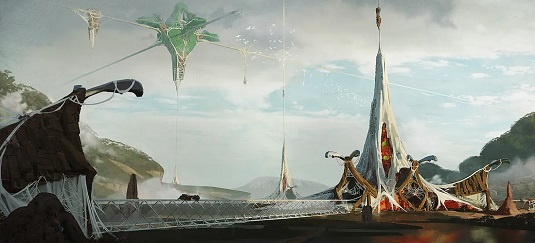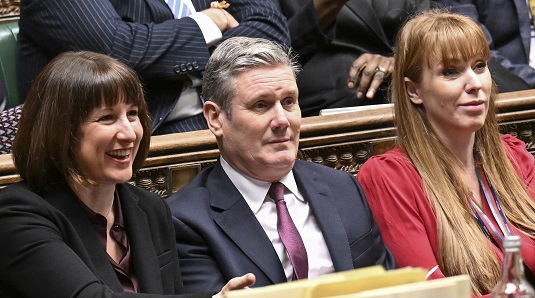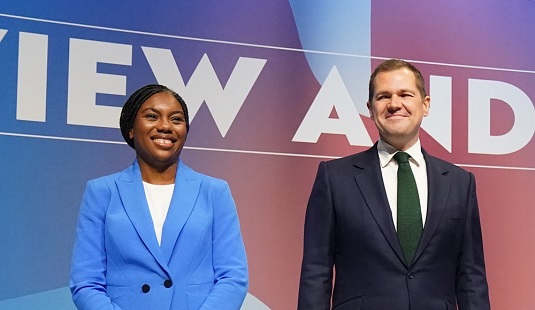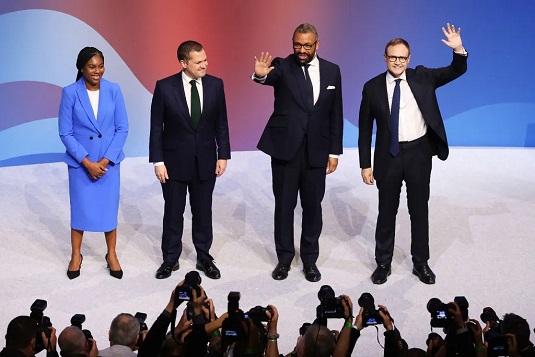Thursday, 31 October 2024
Mortiis - Parasite God
Wednesday, 30 October 2024
A Typical Labour Budget

"This is not a budget we want to repeat", said Rachel Reeves of her Autumn statement this Wednesday afternoon, but if past behaviour is any indicator of future behaviour then she'll make similar choices again and again and again.
I won't wear anyone's patience by raking over the minutiae line by line. Yes, on balance this is a budget in which the most privileged will be coughing up a fraction of the huge gains they banked under the Tories. Hence the absurdity of the 'Comrade Reeves delights the workers and peasants with class war' headline on Conservative Home. This was nothing of the sort, but tallies with what was argued the other day about their hypersensitivity to any measures that strike at unearned income - the lynchpin of class relations. And so, the pips are squeaking as VAT goes on private school fees and business rate relief ends, huge duties are slapped on private jet passengers, capital gains tax goes up (but is still not equalised with income tax), non-dom status is scrapped, the minimum wage increases, and more will be scooped from inheritance and stamp duty.
And where will the money be spent? Commitments have been confirmed on sending HS2 to Euston, reversing the Tories politically motivated cuts. NHS and education spending will increase by 4.7%, a £1.3bn increase in council funding - but that would not meet the demand on adult social care and children's services alone. £12bn was also set aside for infected blood compensation, and £2bn for victims of the Post Office Horizon scandal. There's also a boost to the miners' pension scheme as the government has stopped taking its punitive share of the fund's surplus. And because there's always money for war, while some departments have to cut their cloth the MoD can look forward to an extra £3bn.
There has been some concern across the political spectrum about the increase in employers' National Insurance contributions, which will raise a projected £25bn. These worries echo the Office for Budgetary Responsibility's comment that this will mostly be passed on through lower wages and higher prices. Far be it for me to defend Reeves, but we know that Keir Starmer's programme is premised on a decade-long series of missions. Therefore, a lot of Reeves's decisions have to be considered in the longer view. Where the OBR's assessment of NICs is concerned, also relevant here is Reeves's minimum wage announcement. Following the Tories, she too has agreed to an above-inflation increase, amounting to approx £1,400/year boost from next April. In the context of the rest of the labour market and pay award structures among larger employers, this could ricochet up the pay structure, particularly for those on modest wages and salaries. More money goes into better paid workers' pockets, meaning more consumer spending, and the consequent multiplier effects eventually cover the NICs increase. This appears to be what the chancellor is banking on.
This was also a punitive budget for many on the sharpest end of the income scale. The bus fare increase stays. Even worse, Reeves confirmed she is keeping the last vindictive Tory attack on disabled people with her carrying through their plan (now her plan) to change the Work Capability Assessment so up to 450,000 stand to lose hundreds of pounds per month. There was more money released for supporting disabled people into work, but no recognition that not everyone can, and nothing about winding back the sanctions regime. As Disability Rights UK put it, "At the end of the day, the biggest announcement was one our community had been expecting: more Disabled and working-class people seeing their benefits cut whilst there will be no real difference in our local services."
This budget was high handed, overly technocratic (supported by a cynical framing), and gives with one hand while takes with another. It was Reeves, after all, who said over a decade ago that Labour didn't want to be the party of benefits, and so the preoccupation with authoritarian welfarism continues. There are elements of longer-term thinking here but not match with funding commitments adequate to the challenge. Her settlements do little to nothing to fix persistent social problems and a crumbling public infrastructure. In other words, because of its inadequacies and petty punishments Reeves's effort lies entirely within the envelope of her predecessors in Number 11. This was a Labour budget through and through.
Image Credit
Tuesday, 29 October 2024
The Futility of Conservatism in Pavane

Keith Roberts produced six interlinked stories set in a stunted 20th century Britain under the heel of the church. An assassin's bullet struck down Elizabeth I on the eve of the Spanish Armada, with the consequence that the invasion was successful and Protestantism was crushed. The country becomes an unhappy satellite of Rome, Britannia never rules the waves, and the industrial revolution unfolds at a snail's pace. The heavy hand of the papacy weighs on technological development, so in Roberts's 1968 there is no television or radio. The internal combustion engine is in development hell, waiting for its sanction by papal bull. There are no railways, with commerce between cities centring on chugging steam wagons. A dependency on horseback remains. Bandits and dangerous wild animals roam the countryside as smugglers plough the waters. Communication across distances is only possible via chains of mechanical towers under control of the secretive and fiercely independent signallers' guild. As our 20th century compressed time and space and sped everything up, history in the world of Pavane is an unhurried crawl.
Unlike most adventures in other timelines, the book is not a dramatic imagining of hero characters triumphing over the adversities and absurdities of an unfamiliar setting. Instead it deals with the small and how, over a couple of generations, these feed into great events. We get stories of the everyday, the mundane, and the seemingly inconsequential. The one constant is the Dorset environs. Crashing seas and cliff edges, howling winds and bleak heathlands, the clouds roil and billow as the landscape husbands the sluggish and harsh lives of those who survive there. This is a world of superstition and faeries where place is inseparable from the old gods and spirits. Dream and illusion is their favoured manner of manifestation, while the omnipresent Church enforces its divine teaching by the materiality of cannon, soldiery, and the torture chamber. There is a plot of sorts, but it rests lightly on Roberts's canvas. This Britain comes alive in brush strokes, of showing rather than telling.
In later years, Roberts described himself as an anti-communist and a conservative, which was somewhat at odds with the new wave milieu he was a central contributor to. But unlike other writers, the conservatism in Pavane is barely perceptible. It whispers its presence in the privileging of the quiet wisdom of everyone who resides in his Dorset, of a semi-mystical spirit that unites (rural) worker, haulier, signaller, and aristocrat. One nation in one county, you might say. More broadly, Pavane does not read like anti-Catholic polemic in the unionist "no popery!" tradition. Rather, the Church here is a synonym for totalitarianism. It is (theologically) internationalist, indifferent to the peculiarities of its English subjects as long as they don't cause any trouble, pay lip service to doctrine, and fulfils the pope's quotas for foodstuffs and manufactories. This is justified by dogma founded on abstract principles.
Pavane is also Roberts's meditation on the ultimate futility of his politics. Conservatism is congenitally dishonest because it presents the particular, monied interest as the universal interest. But it's also fundamentally pessimistic. Conservatism knows its efforts to preserve what it values are doomed, that the better yesterdays it imagines (or, to be more accurate, invents) are doomed never to recur. While for Roberts the Church Militant is his bogey and Soviet surrogate, it also works as the location for working through conservative anxieties. Based on traditional authority in Max Weber's sense, its ecclesiastical grip cannot halt the flow of history indefinitely. Corfe Gate, Roberts's final story follows the eruption of open defiance and insurgency, enabled by forbidden technologies that work around the sanction of excommunication, and the concluding Coda chronicles the break out of modernity as the papacy crumbles before the hammer blows of revolution. For all its vast apparatus of repression and the chilling effect of its theology, this authoritarian conservative institution could not stymie the flows of history forever. A realisation that might make a commitment to a quieter, more modest everyday conservatism a fruitless exercise, but also the only conservatism that is palatable given the excesses of Pavane's imagined Catholicism.
Because of its pacing, light plotting, and eschewing of the thrills and spills of contemporary SF, Pavane is not for everyone. Those expecting something of that stripe, or even in the ballpark of A Canticle for Leibowitz might wonder what the fuss is about. But readers who appreciate literary fiction and enjoy the flow and beauty of evocative prose will encounter an exceptional work. Not just one of the best SF novels, but a novel of the first rank that deserves canonisation among the English greats.
Image Credit
Monday, 28 October 2024
The Political Cost of a Peppercorn Saving

Announced by Keir Starmer at his pre-budget media address, raising the cap is one of those choices the government can use to emphasise their well 'ard credentials. The cheeky Number 10 press release is written up to suggest that passengers should be grateful for the government's largesse. We're told £1bn is being invested to make "better bus services". This will guarantee that fares "remain affordable" while being "fair to the taxpayer". As if bus users and "taxpayers" are two discrete entities.
As ever with this government, scaling back support for bus services is not a technocratic exercise. The 'why?' lies in the politics. Having spent a lot of last week defending their long planned measures to levy taxes on unearned income, they think the consequent outrage and the media trouble could be offset by attacking things that poorer people depend on. Such as bus fares and winter fuel allowances. I.e. They think an 'all in it together' budget that apportions the "necessary" sacrifices evenly means there will be less of a political price to pay when those with the "broadest shoulders" are asked to cough up.
This might work with the Starmerist base in the professional and managerial sectors. To them it looks equal parts fair and fair-minded, and will fire off much-needed serious vibes after their grown up image took a knock following freebiegate. But if they're hoping to mollify the Tory press, until they retreat on unearned income and wind back the workers' right plans to nothing they will be dogged and dogged and dogged, no matter how much they axe supportive measures for the poor and most vulnerable. And so here we are. For the sake of a tiny amount of money and a barely visible perceivable political advantage, Labour is set on demobilising the support of the people they need for it to remain in office. Again.
Sunday, 27 October 2024
Labour's Problems with "Working People"

Let's clear this up for the performatively stupid. What Labour is really talking about is unearned income, which was already clear back in June. That is income from dividends, capital gains/share transactions, high value property sales, and rents. As sundry members of the government have tried arguing, working people are, shockingly, people who have to go out to work. Albeit mixed in with ad hoc digressions that includes people who can't simply write a cheque to get them out of trouble. Cue the tedious merry go round of offended landlords, business owners, and so on all claiming the mantle of horny-handed sons of toil.
For Marxists, class is simple and complex. Simple, because it's about one's relation to the means of production. The majority of working age people have to sell their labour power in return for a wage or salary, and the vanishingly tiny minority live off the proceeds of capital. Complex, because there are huge disparities within the proletarian class in terms of income, autonomy at work, and powers invested in their roles at work. And this is before you get to the myriad of contradictory locations, and the not negligible numbers of self-employed and small business people that comprise the work force. Class is never as neat as the categories used to describe and explain it. Class is a process, it's always in movement, but we can identify and consider occupational strata, age cohorts, and those so-called edge cases where income from work is supplemented by the profits extracted from the labour of others. We have to do this if we're in the business of building a politics that can challenge the supremacy of capital, and supplant it. It enables us to get a handle on who might be supportive of this struggle, and who are likely to resist and cling to the bosses to the last.
But for mainstream politicians, their attempts at defining class has a different purpose. Politics has to create a subject. I.e. Who is it that politics is addressing? It can be an amorphously rendered nation (as per conservatism) or "the people", as favoured by populist politics. While Labour has its roots in the workers' movement, it has long been the contention of Labourism as a whole that it must appeal to the electorate at large and avoid the "sectionalism" of being seen as a working class concern. On the left, this has manifested itself as ethical socialism and moralism. On the right, it's been a faddy procession of different categories. In both instances the consequence is the liquidation of class as a meaningful political category.
The trick Labour and other mainstream politicians have to pull off is to create a subject without mobilising one. It has to be broad to the point of being almost meaningless, but definable so the electorate - as consumers of political product - can identify themselves with them. Hence a formulation like working people. Anyone and everyone is a 'working person', and those who are not are either retired and have done their bit (not that this protects you from Labour's attacks), or are the undeserving poor who need to feel the the lash of hard discipline. In her article for The Sun this Sunday, Reeves aligns 'working people' with "families" and "strivers", call backs to fuzzy categories like 'hard-working families' and George Osborne's 'the strivers vs the skivers'. And while we're here, Nick Clegg's old favourite: "alarm clock Britain" fits as well. They are woolly and wide open, but again have that edge that can be turned against the imagined idle other to support punitive policies and authoritarian welfarism.
The reason why Labour have got into choppy waters over this is because the media have called them on their bullshit. And the media has done this because it's hyper class conscious. The headlines roar about Labour's war on Middle England and billionaires fleeing the country are hysterical considering how Labour's taxes on unearned income are incredibly modest. The point, for the satraps of the ruling class is these measures visiblise the lynchpin of bourgeois power. British capital is notoriously short-termist, but large sections definitely are not when it comes to the stability of class relations. Having already faced political shocks from the brief interlude where the left took over Labour, to the fact a mass street movement emerged unexpectedly to oppose Britain's involvement in the massacre of Palestinians and had an impact on the general election results, and how a lot of bosses are still nervy about the challenge to workplace discipline thanks to Covid, they are worried where this very slight challenge to unearned income might end up. And, as a result, the press attacks on Labour are ramping up. It's therefore reasonable to suppose that getting into muddles about definitions of working people and all the other recent difficulties might be mere warm ups for the roastings to come.
Image Credit
Thursday, 24 October 2024
Speculative Sociology in Children of Time

Children is set several centuries into the future and we've made our way out among the stars. Earth-analogues are non-existent, so we have to make them and terraforming efforts are underway on several worlds. But not all is well. There is a schism on Earth between the relatively enlightened technocracy that runs things, and anti-tech zealotry. An insurgency erupts and civilisation is laid to waste, with saboteurs destroying humanity's off-world presence and vicious malware effectively bricking any advanced technology that is left. The war breaks out as Dr Avrana Kern is about to experiment with accelerated evolution. Her world has been successfully terraformed and has prepared a group of nano-virus infected monkeys that should bootstrap them to sentience within a millennia or two. Unfortunately, her station is destroyed just as she escapes to the monitoring pod. Unbeknownst to her, the poor monkeys are toasted on atmospheric entry but the nano-virus makes it to the surface where it finds an accommodating host: Portia labiata - jumping spiders. As the centuries roll on, civilisation re-emerges on Earth after a war-induced ice age but as the glaciers recede the poisons of the past thaw out and destroy what's left of the biosphere. The survivors are forced to scrape together the Gilgamesh, a generation ship, and head out to find the terraformed worlds hinted at in the 'old empire's' surviving records.
Tchaikovsky isn't the first to imagine a civilisation arising from another species, but perhaps no one has managed it with such aplomb. The world building is among the best that 21st century SF can offer, but this is much more than a latter day The First and Last Men. The narrative is compelling as the spiders climb to sentience and build a sophisticated society, as setbacks on the Gilgamesh reduce the humans to barbarism and, toward the end, bloodthirsty would-be conquerors of the spiders.
On the spiders, they share their world with several other sentient and semi-sentient aquatic, arachnid, and insect species. Spider cities emerge resembling shifting structures of webbing (what else?) based around matriarchal households. Males are, like their real life counterparts, much smaller and endure a second class existence as discards and, sometimes, post-coital prey. There are also significant evolutionary filters the spiders have to overcome. The first is an out-of-control super colony of mutated ants. The nano-virus has developed a non-sentient collective nest intelligence that works like a computer, and threatens to overrun all spider settlements. They are only defeated by employing chemical manufactories to render the ants docile. Thanks to the manipulation of scent the great nest is programmed to serve spider kin. It also has the happy affect of accelerating technological development as the ants had mastered mining and metal smelting.
The other key factor in their cultural development is The Messenger. A small star that whips through the night sky, this is Kern's life pod/sentry construct. From the ants the spiders learn it is broadcasting radio, and as they decipher the utterly alien human language they are driven to develop mathematics to crack the code. Unfortunately, as Kern by this time is a half-mad composite of human, an AI copy of her personality, and the life support system that sustains her she sets herself up as a god and urges the spiders to follow her message. The results are schisms and wars, with the largest city of Great Nest the seat of orthodoxy and its sometimes rival Seven Trees cast as the apostates. Great Nest's armies carry all before it until a wiley male refugee creates a method for programming ant armies on the fly. The religion is overthrown and, as a price extracted for his invention, Seven Trees and other spider cities concede full personhood status to the males.
Meanwhile, things go from bad to worse for the humans aboard Gilgamesh. As they approach Kern's world they are forced to retreat in the face of the sentry's weapon systems. But not before a crash landing and a rescue reveals the planet is infested with oversized bugs. They head off to another terraformed world but find it's a bust. From pole to pole it's covered by an extremely invasive species of fungi. They are able to salvage some useful ancient technology as a sticking plaster, but their only option is to turn back. After internal power struggles they approach the world with their weapons armed for a war of annihilation ... but are shocked to find the spiders have now mastered sub-orbital space flight and have built an equatorial ring (also out of webbing, of course). Who will prevail?
Tchaikovsky's speculative sociology is more or less on point. While the spiders have developed a class society, the taming of the mindless ants provides a material base that means it's a lot less exploitative and conflict ridden than human communities. There is also a stronger sense of empathy among them thanks to the novel way they can pass on knowledge. The spiders discover that some selective breeding allows for Lamarckian evolution. Experiences, behaviour, and "understandings" can be written into the genetic code and passed on. They are later able to isolate this further so one can go to a library and effectively inject a memory, a skill, or knowledge. This all thanks to the nano-virus's mutations. It's this ability that ultimately saves both species. The spiders lead an assault on the Gilgamesh and overpower its defenders through chemical warfare. But this is a passive technology based on re-engineered nano-virus. Exposure to it causes humans to empathise and recognise the spiders as sentient beings, and that war against them is futile and wasteful. If only questions of war and peace could be settled so easily.
Children of Time sits well with Tchaikovsky's SF oeuvre. In The Doors of Eden, only the merging of radically divergent parallel Earths can save the universe. The Shards of Earth sees humanity combining and hybridising with alien species to see off civilisation-ending threats. Dogs of War and Bear Head are about bio-engineered super soldiers that are crossed with animals. And Alien Clay sees an exile from a totalitarian Earth get to grips with the weird diversity of an alien ecosystem. Here, the spiders progress not through the exclusion or extermination of other species but by a benign domestication of their environment. The use of chemicals and scents are central to their symbiotic relationship with the ants, and likewise humans are only able to overcome their declinist, warmongering rut by becoming a companion species comfortable with the oddness of the other. Donna Haraway would approve. The book therefore ends on a hopeful note some decades after the spiders and humans have come together. A signal is received from another world and a multi-species starship crew are dispatched to investigate. Hence the next volume, Children of War, has its jumping off point. Once again, without bashing us over the head difference and multiplicity are shown to be our route to a better future. Those that emphasise oneness, be they closed identities or symptoms of contemporary alienation are dead ends. Children of Time serves as an entertaining reminder of this.
Image Credit
Tuesday, 22 October 2024
How the Tories Might Win Again

As long time readers know, I've been banging on about the long-term decline of the Tories for a while. They are not reproducing their electoral coalition, and this process hasn't stopped just because they've suffered a cataclysmic defeat. What is sure to compound the Tories' problems is the inability or unwillingness of their leadership contenders to acknowledge them. But in politics nothing is neat. When a party, a movement, or a politician is ascending the path to winning is rarely smooth. There are setbacks, reverses, and temporary troughs. Decline is no different. False dawns break that promise revival, there are flashes of strength show up here and there, portents and omens of good fortune are seized upon. There is no linear descent. The spiral downward is mistaken for forward motion. A couple of exhibits from the recent past: the huge vote won by Theresa May in 2017, and the absolute maxing out of this approach under Boris Johnson in 2019. Neither of which changed the Tories' declinist course, as argued here at the time.
This means that the fact of decline does not rule the Tories out of contention for 28/29. What makes an election win difficult is the politics. It's doubtful many Liberal Democrat or Labour voters will ever again tick the Tory box in the polling booth. People have memories, after all. And as Cunliffe notes in her piece, only 30% of Reform voters would have supported the Tories had Nigel Farage's "party" not stood, with 26% abstaining. But a very narrow Tory victory is conceivable for a few reasons.
For one, there is a marked tendency for governments to lose support. The Tory performances in 2017 and 2019 were anomalous because of Brexit, Corbynism, soft polarisation, and the successful reinvention of the Tories under new leaders. In five years' time, Keir Starmer will probably remain Labour's leader with all the baggage of incumbency that entails. Secondly, apart from against the Labour left the Labour right don't have a theory of political struggle. Rather than challenge established prejudices or offer political leadership, their default mode is to tail the (media confected) public opinion and hope a record of delivery will convince enough punters to give them another try. A managerial conception of politics that leaves a lot of hostages to fortune because initiative is ceded to their opponents. Say what you like about Kemi Badenoch (there's no use pretending any more), she undoubtedly will exploit the hypocrisy of Starmer's "Mr Rules" briefcase technocracy and might win a few converts. Last of all is a fraying of Labour's vote. This is not structural in the way Tory decline is but is a consequence of Starmer's politics and Morgan McSweeney's galaxy brain strategising. By demobilising and decomposing the Labour vote, it is being scattered to the four winds. This was evident before the election, can be seen in the result itself, and has continued apace afterwards. This leaves the government vulnerable.
It's not difficult therefore to see how the Tories could find a route back. Not because they're popular - Kemi-mania is most unlikely. But because Labour has hitched its project to key performance indicators that won't matter to most people unless they experience a shift for the better in prices, wages, housing, and public services. Discontent is less likely to drift to the Tories, but head in the direction of the Liberal Democrats, the Greens, and the left (if it can get its act together). If Badenoch's rightist platform stems the bleed to Reform and attracts some back, there is an outside chance the Tories could become the largest party simply because their opponents' votes are spread even thinner. Whether they could form a government is another matter.
Labour could avoid this fate, but it has done the "grown up" thing and bent its knee to capital. The Tories are not in with a shout of winning again because they have a clever strategy that can arrest the declining coalition. Its fate is entirely in the hands of the Labour leadership. By dispersing the party's base, Starmer is offering the Tories a sporting chance.
Image Credit
Sunday, 20 October 2024
On Wes Streeting's Weight Loss Injections
For once, Streeting is telling the truth. This is not an experiment in dystopic social engineering. The trial's plan wants to find out what care packages are most appropriate to those who receive this treatment, as well as tracking the drug's long-term effects. If it works as advertised then it could be beneficial and life-changing, and will have knock on effects where obesity-related NHS care is concerned. In other words, what concerns is less the trial and more the political uses to which this could be put.
For Streeting, there are obvious political benefits. Cutting the £11bn spent on obesity care by making it increasingly superfluous has its attractions. As he said, he hopes the success will speak for itself and encourage others who need it to take the drug, which ties nicely in with his vision of the NHS as a preventative as opposed to a care service. A couple of wins that will finesse his credibility when the inevitable run at the leadership comes. And there is the other side, of making the NHS a guaranteed market for Tirzepatide and other weight loss drugs. But more importantly, as a tool of governance. For Streeting, the Department of Health is really an economic growth department. He talked about this in relation to boosting the life sciences at his Tony Blair Institute speech a week after taking office, but the obvious implication is that he sees his brief as fixing people so they can be fed back into the labour market. This government's number one priority, heard ad nauseum, is growing the economy so decent public services can be provided for. Everything else is subordinate to the aim of our producing profits for other people.
But it's wider than that. Streeting has jumped on this in the same week Liz Kendall said job coaches would be let loose on the mentally unwell to get them out of clinics and into jobs. She argued that getting into work can improve mental health, which is something that Iain Duncan Smith used to often say when challenged about the axe he took to social security. In context, for Streeting, Kendall, and the rest of them, upping the conditionalities of social security and reducing welfare to an authoritarian instrument comes naturally to them. They (mostly) come from modest backgrounds and made it to the top, so why can't anyone else? Hence unemployment is a consequence of individual poor choices or, in this case, infirmities. Get them fixed and the benefits bill can come down. Never mind the fact unemployment is a structural issue and that the people out of work always exceeds the number of vacancies. Whether they're dealing with obesity or mental health difficulties, the onus is on them to sort themselves out and be available to employers. If they don't cooperate? There are sanctions available for that.
There are differences between Labour and their Conservative opponents. Keir Starmer wants to modernise the state. The Tories want to wind it down. But when it comes to the fundamentals of supporting the most vulnerable in Britain (or otherwise), they are one. Compassion and care are words in a dictionary to these people. But there's another C word that comes through loud and clear: cruelty.
Image Credit
Saturday, 19 October 2024
Badenoch's to Lose

That's by the by. Never let it be said the Conservatives are incapable of learning. Aware of the evident damage and bad feeling the last round of public debates did the party, this time the apparat has thrown every obstacle in the way of a TV clash going ahead. The Telegraph reported that the Tories had set several conditions on it taking place on the BBC. They demanded that the Question Time special's audience be made up entirely of party members, and that they should pay a £10 admission fee to "make sure they turn up". It is well known that studio audiences for public broadcast attract no charge in this country. Furthermore, where Question Time is concerned the production team do try and fill out a politically balanced audience based on voting intention, and the BBC were not going to compromise on this. This was to Jenrick's chagrin. Miles behind Badenoch, he can only gain from a head-to-head. He said he would be "delighted" to debate Badenoch at the BBC. For her part, she said she would abide by the party board's ruling. The cheese is hard for some.
Yet one public debate did take place. On Thursday, GB News broadcast a two-hour long programme. To call it a debate would be a misnomer. Both had an hour each to set out their stall and take questions. There were to be no repeats of the clashes that brought a little colour to proceedings two years ago. The Conservative Home headline said it all: "Two hours of our lives that we’re never getting back". Jenrick opted to go first and spent half his speech banging on about immigration and how we need to leave the European Convention. He set fire to the Tories' record in office, and accused "foreign courts" of letting terrorists into Britain. It's obvious what Jenrick is trying to do. He's hoping muscular posturing will cause the right wing party members - the overwhelming majority - to give him a second look. The problem is that Jenrick's a dweeb. Despite quitting the government over the issue, that looked less like a principled stand and more a contrivance to give his run at the Tory leadership some credibility. But it's fallen flat. Apart from a charisma bypass, he's just not credible on these issues with the membership. They remember his past life as a Dave-era A-lister who was gifted his Newark seat in 2014, and as someone who loyally campaigned for remain in the EU referendum. Then there is the small matter of his being the immigration minister up until last December. That he did his damnedest to make new arrivals feel unwelcome and defended protests outside hotels hosting refugees (well before the riots) counts for nothing. For the Tory membership, he's a briefcase just saying and doing what he thinks will work. Being well inured to dishonest politics, they know a cynic when they see one.
The same can't be said for Badenoch. Introduced to public prominence at the last leadership contest, apart from the culture war cliches she did then have something interesting to say about scrapping the Treasury and spending being a direct competence of the Prime Minister's office. Unfortunately, in the two years since she has become more acquainted with the way the state structures class relations and how central the Treasury-Bank-of-England-City nexus is to the whole set up. Not that the Tory membership care about this. For someone who apparently hates the culture wars, she has fought them with alacrity. As Women's and Equalities minister she has assuredly used the position to oppose a better deal for women, and has come out with clangers about maternity pay, the minimum wage, and carers. And there was the small matter of demonstrating sympathy with far right street thuggery. For the membership though, as a Brexiteer and as a politician who's never been backward about being forward she's the real deal. So during her speech for GB News, she didn't have to flex with attacks on the ECHR and other such performative nonsense. The membership feels Badenoch is one of them, and she is. By way of demonstration, at the end of the GB News "debate" Christopher Hope asked for a show of hands about who the Tory audience would be backing. Let's say the result for Jenrick suggests he can look forward to a Liz Kendall-style outcome.
And so it's Badenoch's to lose. It's difficult to see how she can snatch defeat from the jaws of victory, short of an earnest conversion to Corbynism or was found to have previously been in secret defection talks with Labour (why not?). If there is one smidgen of hope for camp Jenrick, the latest poll on what the public thinks puts him ahead of Badenoch. Yes, a massive 14% versus her 13%. Combined, that is less than the 31% who indicated 'none of the above'. I suppose the Tories ought to be thankful for the unseemly power struggles and amateur dramatics that have marked Labour first few months in office. Because if Starmer had had a smoother start and avoided the stupid own goals, this poll would be even worse and the Tories even more of a marked irrelevance where most people are concerned.
Image Credit
Wednesday, 16 October 2024
Drawing the Battlelines

About McSweeney's politics, he impresses the easily impressed because it's all about winning. And what Labour needs to do now it's won office is make good its promises and deal with the people's priorities. This, the piece argues, is where he believes other centre left governments in Western Europe have gone wrong. For example, their support do not want mass migration and yet that's what they get. The result is their chances going down the tubes and the far right piling on electoral weight. From our point of view, McSweeney is an instantiation of Labourism's most backward characteristics - office for careerism's sake, an absence of the possibility that things might be better, a commitment to a model of leadership that tails, rather than leads, public opinion, and hostility to wedge issues, regardless of how popular they might be. For all the hype, under his political direction Keir Starmer is already treading the same steps that has undone social democratic parties on the continent. It remains to be seen whether the outcome will repeat history as tragedy or farce.
This post, however, isn't just about McSweeney. With the Labour left back in its box and the left outside wondering what to do next, the sort of bickering and jockeying we saw during the Blair and Brown years is never far away the surface. Already, there is disquiet that Starmer passed over time servers to appoint newbies to plum positions. Some are unhappy that key ministerial roles have gone to unelected appointees. With a bloated parliamentary party and only so many jobs to go round, what work might the Devil make for these idle hands once the new cohort have got over the novelty of office? Clearly, Starmer is already worried hence the immediate suspensions following the benefit cap rebellion, and we learned last week about the Labour whips' ham-fisted efforts to curb dissent. Does this look like a strong government confident in its politics to you?
While McSweeney appears not to have a hand in these moves, he does have a side-project that could exacerbate inner party struggle. This can be summed up in three words: stop Angela Rayner. Over the last four years, the apparat has gone out of its way to clip her wings and, to be frank, humiliate her. There was the not-at-all dodgy disposal of Sam Tarry, the blocking of Rayner's supporters from shortlists across the North West, the pettiness of refusing Andy Burnham a platform at Labour's conference, the concealing of information from Rayner and her allies in the cabinet, the endless consultations and watering downs of the workers right agenda she's made her own, and last week's brutal mugging of Louise Haigh. McSweeney and mates are on a mission to keep Rayner from getting the top job. It's partly political: her journey from enthusiastic Corbyn ally to enthusiastic Starmer stooge suggests a fundamental political unreliability. If she becomes leader, her soft left Labourism not only differs from the Milquetoast managerialism McSweeney and Starmer prefer, like Ed Miliband she might inadvertently open the way for a left revival. Then there is the personal. Rayner and her allies have not forgotten nor forgiven the slights against them, and there will be a reckoning if she lands in the driving seat. It follows this preoccupation with Rayner will continue with her being cut out of decisions, her allies presented with trays full of fait accompli, their policies spiked, and efforts at making the party safe for a right wing successor to Starmer. McSweeney is counting on the services he rendered scores of new MPs for when the moment comes.
The beginnings of Labour's new psychodrama is there, and for a man who is reputedly political to his finger tips McSweeney will have a hard time leaving off his vendetta against Rayner and the soft left. What else might one expect now the adults are in charge?
Image Credit
Sunday, 13 October 2024
New Left Media October 2024

1. Data Vampires (Limited podcast series) (Twitter)
2. Galaxy Burn, a 40k Podcast (YouTube channel) (Twitter)
3. Marx's Dream Journal (Substack) (Twitter)
4. Red Bird (Bulletin) (Twitter)
If you know of any new(ish) blogs, podcasts, channels, Facebook pages, resources, spin offs of existing projects, campaign websites or whatever that haven't featured before then drop me a line via the comments, email, Facebook, or Twitter. Please note I'm looking for new media that has started within the last 12 months, give or take. The round up appears hereabouts when there are enough new entrants to justify a post!
Image Credit
Saturday, 12 October 2024
One Hundred Days of Sod 'Em

I'm not unreasonable. Even the most radical of reforming governments wouldn't be able to implement its full programme in its first 100 days (coping with capital strikes and facing down a coup might prove to be distractions). Starmer is not offering anything like this. His programme is one for restoring the legitimacy of governmental authority and modernising the state. Tilting the balance away from capital toward labour is definitely not on the cards. We can't well have "working people" getting ideas above their station. The issue therefore is not pace, it's content.
Consider these two exhibits from the last week. Angela Rayner's bill of workers' rights was unveiled (again) a few days ago. And, what do you know, we have yet more watering down. How long before they become purely homeopathic? The "rights from day one" now allows bosses to impose a nine-month probationary period on new employees. Introducing the single status of worker, which had already been weakened to allow for two different statuses "as a step toward one" is ... subject to further consultation. As is the right to switch off from employer harassment outside of working hours, ending pay discrimination, and strengthening parental and carers' leave. A fundamental and irreversible shift in the balance of power and wealth in favour of working people and their families this ain't. And on top of that we have to wait another two years for this to take effect anyway. Labour: never knowingly urgent in helping the workers it was set up to represent.
And then there's the row about P&O ferries. When they sacked 800 workers a couple of years ago to bring in scab labour on much lower wages, it was so outrageous that even the right wing press and Tory ministers condemned them. Nothing came of it, because Tories are always going to Tory. It is verboten to encourage the slightest expression of class-based collective action around workers' interests. As recently as three days ago, Labour was singling out P&O as a bad employer. This was following transport minister Louise Haigh rightly describing the firm as a "cowboy operator". But not any more! In the world of Starmer and the new guru of politics, big business exists and it's there to be kowtowed to. So with the threat P&O's owner, DP World, was going to pull out of a Downing Street business vanity summit and put a £1bn investment on hold, Starmer stuck his foot out and sent Haigh tumbling under the nearest bus.
It's almost a pattern of behaviour. Starmer likes to talk about working people as if they're the salt of the earth, but if they are looking for support from this government and/or relying on them to strengthen their hand in the workplace, he's more interested in salting the earth. Perhaps the Prime Minister would change his mind if P&O workers clubbed together and bought him a spa weekend for two in the lake district.
Over the last hundred days the only thing Starmer and his cronies have fought for with any conviction is their right to trough freebies. We've seen his back office helpers boasting about how they stitched the Labour Party up, the attack on Winter Fuel Payments not to "save money" but to wind back universalism, the renewed fondness for the PFI scam, the decision to not give needy kids immediate relief, and fog-horning from the roof tops about clamp downs on social security support for the disabled and the mentally ill. Labour took office because voters wanted to see the back of the Tories, and an end to Tory policies. Instead, these hopes have been cast aside. We've had one hundred days of sod 'em.
Friday, 11 October 2024
Nalin & Kane - Beachball
Wednesday, 9 October 2024
The Tories Have Lost the Next Election

The result of the final ballot is an interesting one, and will occasion much confusion among "professional" political commentators. On the surface there's a roughly even three-way split. How can the Tories possibly get their act together now? It's because the politics matters the most, and the personalities come second - that's how. The real split is between the third or so who supported the "centrist" briefcase campaign Cleverly headed up, and two-thirds who think off-the-deep-end culture war drivel is the party's route back to the big time. In other words, the populist turn inaugurated by Boris Johnson still hasn't played itself out among Tory parliamentarians. The cheap tricks and scapegoating ploys of the recent past are crack cocaine for these people. The issue is they need a clown to front them for the act to work, and while the politics of Badenoch and Jenrick owe a heavy debt to the Big Top neither have the personality or charm for it to be convincing.
This one-third/two-thirds split therefore means moves toward the centre, and a direct contestation for the scores of seats lost to Labour and the Liberal Democrats becomes much harder. Those soft Tory-curious voters left the party's orbit a while ago, thanks to their weak efforts at addressing the problems their government has caused, and the endless scapegoating and distraction tactics. However, as long argued here the Tories are not "mad" to make a right wing turn. After a crushing defeat in which Reform's campaign was decisive for the loss of dozens of seats, it's simple arithmetic to add their support to the Conservative vote and, hey presto, more votes than those won by Labour. Heading off to the right also apparently solves the crisis of the Tory base. In their imaginary, the party lost votes to Nigel Farage because they weren't conservative enough. The small boats kept on coming, legal migration still went up, and measures designed to deal with them were stymied by "foreign courts". Promising toughness and crack downs is how to win Reform voters back.
But those voters are not interested. Our two-thirds majority forget they went into the general election promising all those things, and Reform still took five seats from them. They might, like Jenrick, say they mean it this time. But here's the difficulty. Johnson was able to build an election-winning coalition because he proved he was serious about Brexit. The tests he passed: defying his rebels, defying the courts, defying the EU, it was all show but it was seen to be done. Something that wouldn't have been possible if Johnson wasn't the Prime Minister at the time, nor if he hadn't led the Brexit campaign in the first place. Farage also, from outside Westminster, was able to demonstrate that he could be trusted on Brexit and immigration. His 25-year political career has thrived because he's done nothing but push these issues. How can Badenoch and Jenrick demonstrate a seriousness of purpose when they both served in Sunak's government and didn't deliver? They can't, which leads them to embrace even more extremism, like soft soaping right wing thuggery, or increasingly desperate stunts. Such as wearing 'Hamas are terrorists' hoodies and saying the SAS undertake extra judicial killings just to avoid human rights paperwork.
What will become of the third of the "sensible" parliamentary party? They will serve in the shadow cabinet of whoever wins. They might even hope to exercise a moderating influence, while manoeuvring themselves into positions of indispensability - just as they did when the wheels came off Liz Truss's premiership. Or some, like our old friend Gavin Williamson, might retreat to the backbenches to support children's charities or join Cleverly in painting Warhammer 40K miniatures. Whatever they do, the defeat of their two banner men is a political defeat for them, and an end to any hope the Tories are going to win the next election.
As previously argued, this is not popcorn time as the Tories set themselves up for five years of irrelevance. Yes, there is humour in the Tories skipping the William Hague stage and going straight for a retread of the Iain Duncan Smith era. But their move to the right can poison British politics further, embolden the extremism of Reform, and encourage racists, bigots, and the self-identified far right to step up their attacks. To give themselves what they think will be a political advantage, the moral vacuity of Conservative MPs means they are gambling with the safety and sense of security of millions of Britons.
Image Credit
Tuesday, 8 October 2024
The Stakes of the Tory Leadership Contest

Those unfortunate to follow the toings and froings of Conservative Party conference should not be the least bit surprised with this outcome. The pol comment consensus, which was right for once, had Cleverly doing well with his speech and capturing momentum. It was the rousing plea of "let us be normal" that won it. Meanwhile, Jenrick and Badenoch suffered self-inflicted wounds and spent vital time staunching their campaigns' lifeblood when they could have glad-handed and schmoozed some more. A reminder that amateur hour is a pastime shared by leading figures of all parties.
Considering the defeated Tugendhat, one can only conclude this was another attempt at jump starting his bid for public prominence. When he entered the 2022 contest, he rhetorically broke with the corrupt legacy of Boris Johnson and promised a "clean start". But the real reason, getting his face known, becoming a player, didn't succeed. As a briefcase Tory, he served in Liz Truss's ill-fated government as security minister and carried on when Rishi Sunak took over. And there he led an undistinguished existence, despite trying to stir the anti-China pot by announcing an investigation into TikTok and its influence. Truly a grey blur, he'll probably be best remembered for his cringe merch than any noted contribution to the Tory party.
So much for the loser, of the three left who might Labour fear the most? Despite the damage done by avarice and unnecessary "tough choices", Keir Starmer is still the beneficiary of popular anti-Toryism and the predicament they are in. If the Tories go right to try and consolidate their base and hoover up Reform's support, that leaves votes toward the centre more or less uncontested. Add to this the antipathy many Reform voters feel towards the Tories, it's by no means certain a strong effort here would put Nigel Farage's concern out of business. But going "centrist" leaves the right flank open for Reform, as well as the door for possible Tory defections. Labour is fortunate because the box the Tories have sealed themselves in is entirely their fault, and their long-term crisis is playing out irrespective of what Starmer and friends do.
Not that left wing Tory watchers have no interest in the outcome. We do. Seeing Jenrick or Badenoch gallop off to the right will only blow more smoke up the backsides of the right wing press, who will be emboldened to go even further right. And because Starmer's Labour is a flimsy construct on an extensive but structurally weak majority, one can imagine the "genius" of Morgan McSweeney will see the government tack right also. The consequence outside of Westminster pantomimes and politics gossip columns will be felt in more scapegoating, a further coarsening of public discourse, more racism, and down the road more of what we saw in the summer. No trust in Cleverly, obviously. He happily supported Johnson, Truss, and Sunak at their racist worst, but a win for him and a defeat for the most demented and politically poisonous section of the Tories might arrest the further mainstreaming of overtly racist politics. Even if only for a brief period. For that reason, one cannot be indifferent about the outcome of the Tory leadership contest.
Image Credit
Sunday, 6 October 2024
What a Gray Day

Despite the hype surrounding Gray, her appointment did not live up to its stellar billing. She was there because, like Starmer, she's a state functionary through and through. She inspired the confidence of the apparat. It telegraphed that, finally, the professionals, the "grown ups", the adults-in-the-room were in charge and the age of overconfident amateurs and chaos agents was done. Let efficient government, smooth government commence with the take over of the state by the state. But things haven't gone that way. If anything, for a new government its disarray has often recalled an administration on its last legs.
Not all of this can be laid at Gray's door. She didn't petition Rachel Reeves to stop Winter Fuel Payments or talk up "the pain" scheduled in the Autumn budget to the point that confidence in the UK economy was severely knocked. And despite the complaints about "Downing Street comms", often repeated from unattributed sources by the New Statesman podcast, freebiegate wasn't a disaster because of inept spinning. It has damaged Labour's credibility and forced Starmer's favourability rating into a nosedive because the Prime Minister won't countenance surrendering the perks of office. Polishing a turd is a messy business. It goes everywhere and makes everything it sticks to stink.
That isn't to say Gray's case is a spotless one. She tried forcing the cadre of incoming spads to accept lower salaries than their Tory predecessors and, in some cases, what they were receiving in opposition. To their complaints she turned a tin ear, forcing an unlikely unionisation effort among a sliver of party staff for whom the words 'solidarity' and 'collectivism' are normally entries in the dictionary. Hence the wave of hostile briefings against her, including the barb that Gray is the only pensioner to have done well out of the Labour government. Not useful to have the operation turning on itself after the gentlest application of media pressure. There are some other wonkish complaints about not having proper transition plans. But, the greatest sin of all was that she did not appreciate that her job was a political one. According to an, again unattributed conversation this time relayed by Sienna Rodgers, an insider said "I think fundamentally Sue Gray is a person with no politics or political experience/nous doing a job that has become very political. And in Morgan [McSweeney] she's got an enemy who is essentially just much better at politics than her."
This is true enough, but who put her there in the first place? It was clueless Keir that made the call. Starmer had enough sense to trust his fortunes to Sweeney during the leadership election and in the factional battles and purges since. But as office approached it appears the understanding that he required a political hatchet man fell out of his head. Perhaps he's made the mistake of snorting his own vapours, imagining that he could do a government and a politics that "treads lightly" on the British people. That once in office, like Macron across the Channel he could pretend to be a Prime Minister that operates above politics. In such a world there is a use for a Sue Gray, but not one for a Morgan McSweeney. Which was why he was initially frozen out. However, Gray's ineptitude and the briefing operation run by camp McSweeney has knocked Starmer off his cloud and brought him down face-to-face with the grubby doings of politics. Albeit pulled off in such a way that the boss doesn't experience it as a humbling. By pinning the blame of everything from freebies to Lord Alli's Downing Street pass to staffing issues and poor spinning on Gray, Starmer was presented with a fait accompli. This was topped off by Gray's decision to fall on her sword for the good of the government. A masterpiece of manipulation for those who get excited by such things.
What now? With McSweeney's people in charge one might expect a more disciplined Downing Street. The impression of a shambles will quickly be replaced by message discipline and rebuttal. Anything that comes out of Number 10 now, as per the days of Dominic Cummings, does so with McSweeney's blessing. That might seem limiting as plausible deniability for "leaks" is reduced, but it enables the PLP to get a read on where their (apparently uncommunicative) leader is going, as well as signalling who's on the up and who's on the way out. Handy for the legions of career-minded MPs. Politically, however, nothing has changed. The opportunity to waste the historic opportunity Labour has remains on track, but that's not what's important. The Labour right's backroom apparatchiks get the goodies they're entitled to, and McSweeney gets to feed his legend - one that should set him up for life. Grown ups, eh?
Image Credit
The Multiplicities of Infinity Gate

The first of a diptych that sits between Baxter and Tchaikovsky, and with a passing resemblance to Harry Turtledove's Crosstime Traffic books, the setting is the Pandominion, an empire comprising tens of thousands of Earths. The citizens of this empire are "selves", the generic term for all its sentient inhabitants regardless of their biological lineage (in these timelines, pretty much every mammalian species had a stab at filling the niche occupied by humans). The Pandominion is also a post-scarcity civilisation, having the inexhaustible resources of infinite Earths to draw on. But historical materialist friends of SF will be interested to note this doesn't mean the Pandominion is a classless society. The traffic between the Earths is monitored and controlled by a Moon-sized AI, and this in turn is employed by a capricious bureaucracy. This society observes the formal trappings of liberal democracy, but the reader is left in no doubt where the power lies. The bureaucracy also controls the Cielo, the Pandominion's force of enhanced and power-armoured super soldiers backed by a supply of inexhaustible and impressively destructive armaments. Yet the empire doesn't go in for conquering worlds - it appears every member has been admitted by consent. They exist, like all militaries, to secure the power of the ruling class and as insurance against external threat. Pandominion explorers have discovered around 17,000 scoured worlds. These are formerly habitable realities that, approximately 500 years before the discovery of step technology, were subject to a cataclysm that wiped out all life down to the microbial level. The speculation is this was the outcome of an unimaginably devastating war between realities, and it's part of Cielo training to give new recruits a tour of these tombstone worlds.
But all is not well in the Pandominion's extensive garden. Stumbling on a mining operation by an AI, a stupid incident in which a group of scientists and a small detachment of soldiers are killed sees the bureaucracy overreact and in it goes mob handed. Except the AIs, which are dubbed by their organic enemies as the Ansurrection, are no push overs and are more than capable of meeting and beating the pride of the Pandominion. There is war across hundreds of Earths, and both sides are in a race to build the mega weapons to defeat the others. Could a new scouring being imminent?
So much for the background. The story follows three characters. The first, Hadiz Tambuwal, is a scientist living on a billionaire-funded campus near Lagos. Her world is much like ours, except more polluted and exhausted of resources. Environmental catastrophe is compounded by swarms of earthquakes, and civilisation falls apart amid the poison and the devastation. She's left alone with a life time's food supply, and only an artificial intelligence experiment for company. With nothing else to do she carries on her research, and stumbles on the ability to step into alternate Earths. Finding the first pleasant but empty of civilisation, she mocks up drones and is able to initiate experiments where they step into hundreds of worlds per sortie, looking for any with signs of sentient life.
This is where we're introduced to Essien Nkanika. He's from a Lagos not dissimilar to our own, and has lived right at the bottom of the pile. He's been a slave, a scavenger at the city dump, and as we find him, a sex worker who prowls the bars down town. His experience has made him amoral and utterly ruthless. One night he encounters Hadiz, and they go back to her place in the docklands. Gradually he's inducted into the mysteries of stepping and quickly realises this could be the making of his fortune. If only Hadiz could be disposed of. Unbeknownst to both, their trips between worlds were noticed by the Pandominion and a small unit of Cielo are dispatched to meet them.
The final character is Topaz Tourmaline FiveHills, or Paz to her friends. She lives on Ut, and is a self whose species climbed the sentience tree from rabbits. She has floppy ears and powerful hind legs that enable her kind to run faster than practically any other Pandominion lineage. Also, though she's 19 she is officially designated as a child in her culture until she turns 30. Whether that's a comment on kidulthood and adulting is up to the reader's judgement. The war with the Ansurrection is raging, but Ut seems far away from the fighting. And besides, Paz has just made friends with the new girl in her class. Dulcie Standfast Coronal is, like her, a bit socially awkward and her AI familiar (not dissimilar to the demons in Pullman's His Dark Materials) doesn't appear to have the same functions as everyone else's. With reports of selves being kidnapped by the Ansurrection, might there be something fishy going on?
Spoilers below.
Carey has done an excellent job of producing a pacey, compelling, and interesting narrative with well-rounded characters and consistent plotting. Among its immediate peers in alternative history, it matches Tchaikovsky's Eden and avoids the aimless meandering of Pratchett/Baxter. In verve, the balance of action, and execution it's closer to Peter F Hamilton's space opera, the Salvation trilogy. For a thick book, there's no fat, but neither is there one improbable scrape followed by another. Like the Hamilton its tone is borderline young adult. The swearing, gore, and infrequent but functional sex scenes just about edge it out but there is a cartoon quality to proceedings. Less Hanna-Barbera unlike some) and more anime, or comic strip. Which isn't surprising considering Carey's pedigree. Over-the-top weaponry, especially the machines fielded by the Ansurrection used to butcher the Pandominion's forces lend itself to such an imaginary, but what cements it are the vestigial animal qualities of the selves. In addition to rabbits, Infinity Gate features characters whose species evolved from cats, dogs, hedgehogs, reptiles, bears, birds. I've probably missed a few. If that sounds like The Get Along Gang with guns, attitude, and timeline-hopping technology, you're not far off. A rabbit girl and adorable AI familiar plus power armoured cats wouldn't hurt marketing a film or streaming adaptation to a mass, teen-adjacent audience.
More interesting is the concern for multiplicity and a plea for difference. For all the diversity of selves in the Pandominion, the bureaucracy and the Cielo hold it together in a disciplined unity to keep the polity and, with it, the class power of their worlds intact. There are distinctions made by selves between those who matter - the empire's worlds and its citizens - and those who don't: the worlds, and therefore the civilisations that exist outside of it. They effectively do not exist, a point reinforced by the conditioning/brutalisation of the Cielo's new recruits. There is also a strong distinction between organic and artificial intelligence. The AI helpmeets used on Ut, and the huge computer that enables cross-time traffic are frequently likened to slaves, and there is some discussion of the ethics of stunting machine intelligences at a service level. AI in this culture is a tool with strictly circumscribed parameters. Despite the cybernetic enhancements enjoyed by Pandominion citizens this hard distinction remains in play. This prejudice frames their antipathy to the Ansurrection. AI isn't alive, it is an automaton. They are a form of non-existence that threatens the Pandominion with death, and has to be destroyed.
Through the point of view of Cammy, we learn the Ansurrection is alive as well. But different. They are fractal life forms, and multiplicity is at the core of their being. There are trillions of intelligences in their civilisation, but their individuality is not discreet. They combine, disassociate, copy, and flit between machine bodies. Their life is so different that they have a hard time believing the Pandominion is alive, let alone intelligent. Because selves are biologically discrete and "alone", the Ansurrection cannot fathom what they are - albeit their attacks on its worlds has been enough to designate them a nuisance. Hence the abductions and the infiltration of agents into Pandominion society. The AIs have got no conception of sociality. They are blind to biological multiplicity and brush it aside. The Ansurrection are indifferent to it as they grind up and strip mine worlds. Cammy then becomes Infinity Gate's most important character. Paz and Hadiz are comfortable with the hybridity she embodies, while for the Pandominion she is a target for capture and study.
Valorising multiplicity and difference is the zeitgeist of contemporary SF. It's deeper than mainly white, mainly Anglo-American authors peppering their narratives with queer female protagonists of colour. In Tchaikovsky's Doors of Eden, the solution to the coming death of the multiverse is not to try and save one at the expense of the others - the solution favoured by his fascist, white supremacist baddie - but allowing all the parallel Earths to bleed into one another. Only by embracing and reckoning with difference can we be saved. In Hamilton's Salvation, it's the military defeat of a hive mind monoculture trying to assimilate the galaxy to its religion. Their defeat not only saves humanity, but frees the scores of species they had interred to meet their God at the end of time (very similar to his Commonwealth novels, albeit those aliens, another hive mind monoculture, want to destroy everything else). It's not that variety and multiplicity is simply good, it is life. Therefore, without reading the sequel, Echo of Worlds, we can suppose that the antagonism between Pandominion and Ansurrection is heading one way. This might involve shedding their present forms (indeed, the narration is clear we're following the Pandominion's final days), but integration rather than annihilation is where we'll end up. The embracing of difference, a liberation of the postmodern sublime and the junking of their limiting oneness - or the rhizome and not the tree - waits at the end of Carey's many worlds.
Infinity Gate is not a deep book, but it is typical of the front rank of commercial SF in the 2020s. It is modish while escaping unoriginality, thrilling without being trashy, and cartoonish without the cringe.
Image Credit
Thursday, 3 October 2024
The Conservative Party's Wake

A quick reminder about what happened in July. The collapse of the Tory position, long forecast round these parts and explored in a certain book (as seen on TV), served up the worst Conservative general election defeat ever. And, even worse, despite Labour's best efforts to make themselves as equally loathsome, it's not obvious how the Tories can make a come back. And that's without the long-term decline of the party being taken into account.
There were two reasonable moments at the conference, and both of them came from the mouth of James Cleverly. He began his stump speech with an apology to the country (albeit not for the crimes committed on their watch), and stood out from the rest of the pack as he pleaded with his party. "Let's be more normal", he said. These were words few, if any of his fellow Tories were interested in heeding.
The two front runners, Kemi Badenoch and Robert Jenrick were competing as if the chair of the Federation of Conservative Students was in contention. Jenrick put massive distance between his origin as a soggy Dave/Osborne era briefcase and his latter day manifestation of right wing bat shittery. Before Iranian missile strikes took out Israeli military targets and an oil platform, Jenrick had cringingly paraded around with a 'Hamas are terrorists' hoodie and pledged that the Star of David should be prominently displayed at every point of entry into this country. He would also, following Donald Trump, move the British embassy to East Jerusalem and, for good measure, vote for him if he was able to because "he's a conservative". Not the sharpest knife in the drawer. And it got worse. On Monday night, he accused the SAS of carrying out extra-judicial killings. He did this not to criticise the special forces, but to put across how the European Convention and its protections makes it harder for them to take terrorists into custody. A point that drew criticism from his edgingly less right wing rival, Tom Tugendhat. To top things off, he proposed a dukedom for noted anti-black racist, David Starkey. Tory MP Jesse Norman summed Jenrick's pitch up best: "lazy, mendacious, simplistic tripe".
Kemi Badenoch lived up to her 'Bad Enoch' billing and managed to be somehow worse. Having warmed the cockles of far right hearts over the summer, she went straight into conference with an Telegraph opinion piece arguing "not all cultures are valid". You don't need mega enhanced reading-between-the-lines skills to know what she was getting at. She gave a very tetchy defence of the position on Laura Kuenssberg, demonstrating an inability to cope with the mildest line of questioning. So much for the hard woman bravado about "walking through fire." It didn't end there. Having argued in the morning that "our culture" means valuing women, that afternoon she singled out maternity pay as "excessive" and symptomatic of the "burden of regulation" on British business. She doubled down on this, suggesting the minimum wage is harming employers. More, give us more! Okay. She jokingly said 10% of civil servants should be banged up because of incompetence, leaking, etc. Ha ha. She rubbished migrant care workers, claimed - without a shred of evidence - that conservative-minded students were marked down at university, and we learned her leadership campaign has its (undeclared) base at the home of a wealthy Tory donor. Not that this stopped her criticising Starmer over his fondness for favours offered by Lord Alli.
Among the other conference highlights were the 'Breed for Britain' fringe (also addressed by Badenoch), a long and indulgent conversation between Tim Stanley and Liz Truss, where she was feted like a rock star. Trump endorsement, check. I was right, check. Clash of civilisations, check. Tories lost because they're too woke, check. If the party was serious about clawing back the ground lost, Truss would be dealt a life time ban from conference. And, if this wasn't bad enough, most of the reports from Birmingham suggest the party members are in a chipper mood. Incredible.
Last year, it was obvious that the Tories could go one of two ways. Head right to consolidate their vote after a traumatic wipe out and see off Reform once and for all, or try something different. The answer, even from the "centrist" candidates is that the indulgence of extreme right wing politics and hobby horses is where they want to go. And that's fine. It might solidify their support on that side of the voting spectrum, but it won't make winning back dozens of Labour and Liberal Democrat-held seats any easier. Making the task more difficult if not impossible, it seems few Tories understand their party is on the verge of permanent irrelevance. This was less a conference, more a colourful noisy, unhinged and celebratory wake. And going by the politics offered by the contenders, they're competing not to lead the party but for the honour of lighting its cremation.
